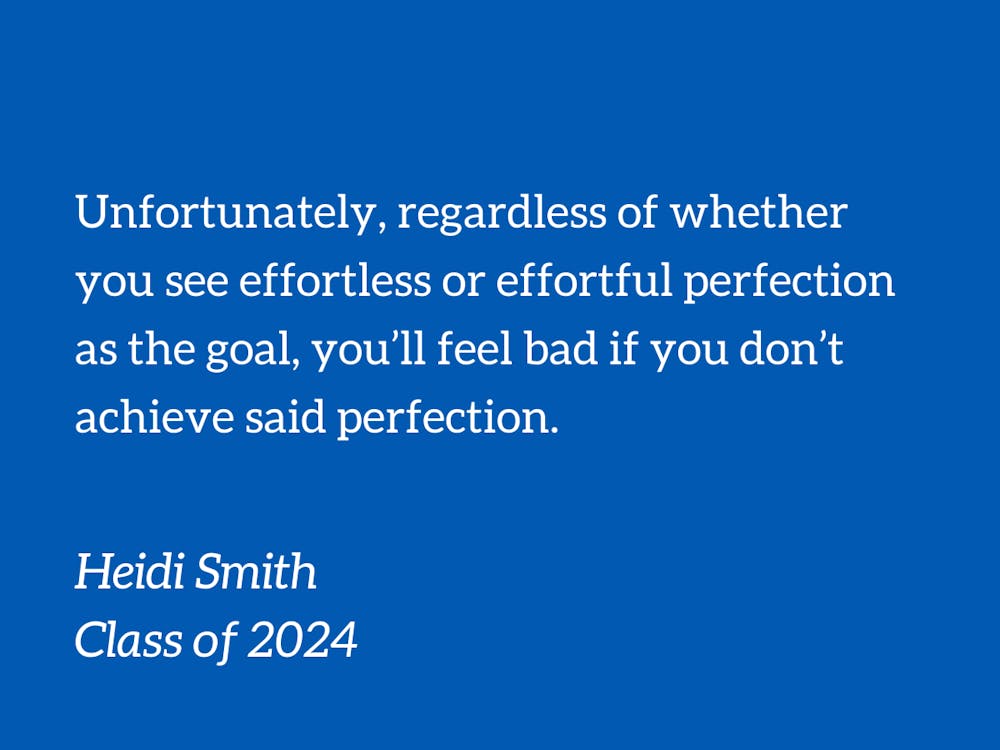It’s safe to say the idea of “effortless perfection” or “the expectation that one would be smart, accomplished, fit, beautiful, and popular, and that all this would happen without visible effort” has been suitably belabored. We’re not supposed to write op-eds about it anymore because it’s so overdone.
It originated here at Duke in a Women’s Initiative report in the early aughts and remains a part of our campus lexicon. Heck, an alumnus even wrote a book about it. In fact, we’ve talked about it so much that a new problem has emerged in response, which I will refer to as “effortful perfection.” Effortless perfection isn’t gone entirely, but we’ve begun to satirize it rather than take it completely seriously—at least, I have.
For example, I’m pretty efficient at doing my homework without much public complaint, so I joke that I never study. Instead of bemoaning how much work I did that day if someone asks what I’m up to, I’ll say how tired I am from running nine miles that morning or share what happened on a recent Bumble date. Maybe a friend will ask if I want to grab dinner or watch a show, and I’ll agree instantly because, in the words of one, “oh, you just have to read a single novel this whole weekend—that’ll take you all of what, an hour?”
We both know that I’ll do my work at some point and that my time is spent on more than just fun; I’ve just chosen the performance of little effort in many of my endeavors. Maybe I spend less time on homework than the average person, but I still get everything done on time. I do sometimes study, but it’s not my whole personality.
Not everyone subscribes to this philosophy anymore. When near perfection cannot be attained through the appearance of minimal effort, the next best thing is to put in a whole lot of effort and make sure everyone knows how much you’re suffering in order to succeed—i.e., effortful perfection. Think about your engineer friends who are “always in the lab,” your premed buds who have a midterm seemingly every week or the tech girlie who is “just so busy” with recruiting.
We don’t always choose, whether consciously or not, one or the other camp to be in, but it’s tough to be in the middle. Maybe you work really hard on your professional life but less so on classes or vice versa, but no one seems to do each in reasonable amounts. You’d think the average student would spend a moderate amount of time on their studies, but it feels like most people either are constantly on some type of grind or just kinda floating through life—though, perhaps I just travel in extreme circles.
But, as a friend who graduated from Duke last year texted me, “Yeah[,] but you see[,] this is [D]uke/You either overcome legitimate life adversity[,] or you have a victim complex.” No one wants to admit that they were admitted or got a certain opportunity because they were born in the right place to the right parents, so we have to make it look like we’re overcoming some type of struggle. Maybe this manifests itself as studying around the clock to get perfect grades to justify your merit, or maybe it’s the playing up of any slight disadvantage we have.
The “merit-related” achievements, like being “accomplished” and “smart,” are more conducive to effortful perfection. Today, getting by academically and career-wise without any effort reads either as a function of privilege or that you’re choosing an “easy path.” There’s no stigma around working hard, but there is one with getting too much handed to you. However, for the more “innate” goals, like being “beautiful” and “popular,” it’s a bit uncouth to publicly vie for these—and the “fit” side of things could get its own article.
Unfortunately, regardless of whether you see effortless or effortful perfection as the goal, you’ll feel bad if you don’t achieve said perfection. Either façade comes with a lot of work—or at least mental strife—but the main difference is in how you choose to portray that effort. If you’re not effortlessly perfect at something, you can always put in more work and hopefully improve. If you’re busting your butt and still inferior, there’s nowhere you can go from that—you can control your actions, but you can’t always dictate their results.
An expectation of effortless perfection isn’t good, and—even if we vie for it against our better judgment—we’ve established it’s unattainable. But, we’ve yet to fully recognize the potential for harm that effortful perfection holds. It’s stupid to compete for who is struggling the most, dealing with the biggest personal problems, working the hardest, getting the least sleep, etc. It shouldn’t be a badge of honor to be doing the worst—while still checking most of the major boxes of success—just like we shouldn’t reward people for making it look like they’re putting in no work and are still thriving. In some ways, we’ve romanticized the appearance of being unwell or in over your head. We shouldn’t want to seem like we’re doing poorly.
I don’t think the want to be effortlessly perfect will leave Duke anytime soon; however, effortful perfection is not a good replacement. It’s good to be honest about what we’re going through and the extent of our efforts, but honesty doesn’t matter when we’re just switching the means and keeping the ends the exact same. Why don’t we change the goal instead?
Heidi Smith is a Trinity junior. Her column runs on alternate Mondays.
Get The Chronicle straight to your inbox
Signup for our weekly newsletter. Cancel at any time.

